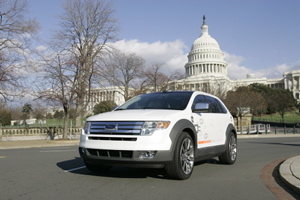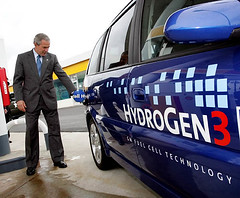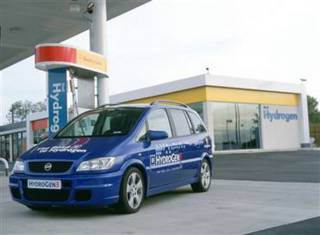Asphalt Nation: The Next Generation (reprint)

A Ford plug-in hybrid Edge cruises on Capitol Hill. Ford Motor Co., showcasing its advanced technology to key policymakers, is unveiling a new battery-powered plug-in hybrid vehicle coupled with a hydrogen fuel cell that generates zero emissions and plenty of potential. (AP Photo/Manuel Balce Ceneta)

Pablo Martinez Monsivais / Associated Press. President Bush removes the fuel cap off a Hydrogen powered compact vehicle during his visit to a Hydrogen Fueling Shell Service Station, in Washington. (5/25/2005).
Except for the photos above and this link to an article in yesterday's Post, "Getting Hydrogen Cars To Live Up to Their Hype," this blog entry is reprinted from March 27, 2005

This Shell gas station in Washington, D.C., is the first in North America to include a hydrogen pump, seen here next to a General Motors fuel cell vehicle. Photo: Shell Hydrogen.

In "New push to make guzzlers hydrogen sippers: The oil-price spike boosts transformation of the auto industry, but huge obstacles remain," the Philadelphia Inquirer's Robert Boyd writes (emphasis added):
"The soaring price of gasoline is giving new momentum to President Bush's dream of a nonpolluting FreedomCAR powered by hydrogen, the most common element in the universe. Twenty years from now, if scientists and engineers can make the dream come true, motorists would be able to drive to a nearby hydrogen service station, fill their tanks, and travel as far as 300 miles without a refill. The only byproducts of the hydrogen fuel would be oxygen and water - no noxious, smog-causing, global-warming exhaust.
But the cost of delivering a hydrogen-powered car to market is a major obstacle, as is the cost of converting tens of thousands of service stations from gasoline to hydrogen. Despite its abundance in nature, producing hydrogen in a usable form costs three to four times more than refining crude oil into gasoline. What's more, while burning hydrogen is nonpolluting, generating the electric power needed to produce it, say, by splitting water into hydrogen and oxygen, could produce more pollution.
Enormous technical problems also stand in the way of converting from gasoline to hydrogen. They include how to produce, store and distribute the flammable gas safely and efficiently; how to design and manufacture hydrogen-burning fuel cells made of novel materials; and how to build hydrogen cars that people can afford and will want to buy. 'This is really the leading edge of applied science,' said Ed Wall, head of the FreedomCAR office in the Energy Department. 'We're engaging the scientific community very heavily.'
'Fundamental breakthroughs are needed in the understanding and control of chemical and physical processes... at the atomic and molecular level,' said Raul Miranda, a program manager in the department's Office of Basic Energy Sciences. 'Such breakthroughs will require revolutionary, not evolutionary, advances.'
The target date for deciding whether a hydrogen-fueled car is practical is not until 2015 - long after Bush leaves office. Critics contend that his hydrogen plan is a retreat from less ambitious proposals to raise mandatory mileage standards and improve the efficiency of gasoline engines. Meanwhile, multimillion-dollar preliminary hydrogen development contracts have been let, and more are coming this spring."
__________
Hydrogen sounds like an energy "cure" not so much for oil dependency but to ward off challenges to the sprawl paradigm of more and more development farther and farther out. Rather than develop a planning and transportation paradigm that is more sustainable, it appears as if hydogen is touted as the next generation fuel to power the cars that fill the ribbons of roads that make up our asphalt nation.
More on hydrogen and hydrogen cars from AP. There is an article about the Shell hydrogen station on Benning Road in the July issue of the neighborhood newspaper Voice of the Hill on page 22, featuring an interview with a Capitol Hill resident who is a staffer with the National Hydrogen Association.
Index Keywords: energy; car-culture



0 Comments:
Post a Comment
<< Home